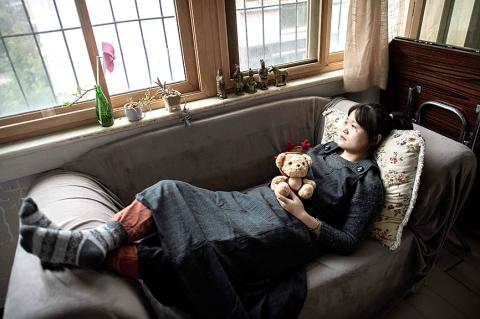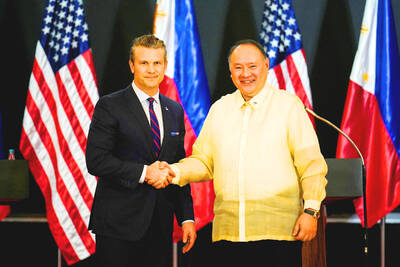Looking at page after page of childhood photographs, Xiaogunzhu was drawn to an image of a French-Irish boy with smiling dark blue eyes.
However, she was not admiring her lover’s family album, she was browsing a catalogue of potential sperm donors — the 39-year-old is one of an increasing number of affluent single women in China that are seeking a child, but not a husband.
Unmarried women in China are largely barred from accessing sperm banks and in-vitro fertilization (IVF) treatment, forcing them to seek options abroad.

Photo: AFP
Her choice made — donor #14471 on the Web site of a Californian sperm bank — Xiaogunzhu flew to the US to begin the first rounds of treatment.
“There are many women who won’t get married, so they might not fulfil this fundamental biological mission,” Xiaogunzhu said, using the name she blogs under to avoid any negative attention.
“But I felt another path had opened up,” she added.
Her baby, now nine months old, is called Oscar after a character in a comic about the French revolution — a nod to the donor’s French ancestry.
The marriage rate in China has been in decline over the past five years. Last year, only 7.2 out of 1,000 people got married, according to official statistics.
PROFESSIONALS
Educated professional women face “discrimination” when seeking spouses, as their male partners have “difficulty accepting their higher educational or economic accomplishments,” sociologist Sandy To said.
However, many feel that struggling to find or simply not wanting a partner should not preclude them from motherhood.
Xiaogunzhu believes a father is not necessary — her own was controlling and often angry, dimming her view of the traditional family setup.
“Why does everyone think that children will ask: ‘Why don’t I have a father?’” she said.
Analysts predict that the total market in China for fertility services would reach US$1.5 billion in 2022 — more than double its 2016 value.
But demand for services overseas for Chinese nationals is also booming.
Danish sperm and egg bank Cryos International has created a Chinese Web site and added Chinese-speaking staff. US and European sperm banks said that they have increasing numbers of Chinese clients.
However, the journey is neither cheap nor easy.
China’s National Health Commission stipulates that the purpose of sperm banks is for “treating infertility and preventing genetic diseases.”
In practice, that prohibits non-married women from using them.
“We want to help these single women, but unfortunately we truly are politically restricted,” said Liu Jiaen, the director of a fertility hospital in Beijing.
Liu said the limitation is “a pity.”
Conceiving a child through a foreign sperm bank starts from 200,000 yuan (US$28,447).
Women must make several trips abroad for the medical procedures, as Chinese law bans importing human sperm.
Women also face discrimination; in Chinese culture, marriage is still considered essential to having a child.
“If sperm banks and related technology like egg-freezing are accessible to single women, it’s a way to safeguard your own reproduction ability,” said Alan Zhang, a 28-year-old reproductive rights activist in Beijing.
Zhang has written more than 60 letters to delegates of China’s parliamentary body asking them to overturn the restriction as part of her work with Diversity Family, the non-governmental organization she cofounded to advocate for non-traditional family structures.
“The state does not do this, so the people can only find their own way,” Zhang said.
MIXED-RACE BABIES
In China, sperm donors must remain anonymous.
However, international sperm banks offer women details like hair color, childhood photos and ethnic background.
“If you choose to use a sperm donor, sperm is essentially a commodity,” said Carrie, a 35-year-old single mother living in southwest China who also requested anonymity.
Carrie said that international sperm banks are more sophisticated than Chinese ones and “able to meet consumer demand.”
Cryos International chief executive officer Peter Reeslev said that given the extra choices, “Chinese women tend to choose Caucasian donors.”
Reeslev said one possible reason is that sperm banks outside of China have fewer Chinese donors — Cryos has only nine donors out of 900 who identify as Chinese.
US sperm bank California Cryobank has 70 available donors out of 500 who self-identify as Chinese.
However, experts say regardless of the availability of Chinese or Chinese-American donors, women are still chosing to have mixed-race children.
“Basically, the selected sperm donors are mostly white,” said Xi Hao, a clinical coordinator in Beijing who helps Chinese customers access a fertility clinic in California.
Zhan Yingying, a cofounder of the Diversity Family organization, said it was rare for her to come across a mother who chose a sperm donor of Chinese ethnicity.
Traits such as double eyelids and pale skin are often valued according to Chinese beauty standards.
“Before choosing the sperm donor I had not considered a particular race,” Carrie said, but after seeing the catalogue she realized she had a preference for foreign physical traits — and now has two half-Danish children.
For baby Oscar, Xiaogunzhu said personality was the major factor in her decision as the donor was listed as “full of joy.”
But on her Weibo blog, photos of Oscar with the hashtag #mixed-race baby draw admiration.
“I personally don’t care about the color of the skin,” she said. “I only care that the eyes are big and the features are good.”

‘EYE FOR AN EYE’: Two of the men were shot by a male relative of the victims, whose families turned down the opportunity to offer them amnesty, the Supreme Court said Four men were yesterday publicly executed in Afghanistan, the Supreme Court said, the highest number of executions to be carried out in one day since the Taliban’s return to power. The executions in three separate provinces brought to 10 the number of men publicly put to death since 2021, according to an Agence France-Presse tally. Public executions were common during the Taliban’s first rule from 1996 to 2001, with most of them carried out publicly in sports stadiums. Two men were shot around six or seven times by a male relative of the victims in front of spectators in Qala-i-Naw, the center

Incumbent Ecuadoran President Daniel Noboa on Sunday claimed a runaway victory in the nation’s presidential election, after voters endorsed the young leader’s “iron fist” approach to rampant cartel violence. With more than 90 percent of the votes counted, the National Election Council said Noboa had an unassailable 12-point lead over his leftist rival Luisa Gonzalez. Official results showed Noboa with 56 percent of the vote, against Gonzalez’s 44 percent — a far bigger winning margin than expected after a virtual tie in the first round. Speaking to jubilant supporters in his hometown of Olon, the 37-year-old president claimed a “historic victory.” “A huge hug

Two Belgian teenagers on Tuesday were charged with wildlife piracy after they were found with thousands of ants packed in test tubes in what Kenyan authorities said was part of a trend in trafficking smaller and lesser-known species. Lornoy David and Seppe Lodewijckx, two 19-year-olds who were arrested on April 5 with 5,000 ants at a guest house, appeared distraught during their appearance before a magistrate in Nairobi and were comforted in the courtroom by relatives. They told the magistrate that they were collecting the ants for fun and did not know that it was illegal. In a separate criminal case, Kenyan Dennis

The US will help bolster the Philippines’ arsenal and step up joint military exercises, Manila’s defense chief said, as tensions between Washington and China escalate. The longtime US ally is expecting a sustained US$500 million in annual defense funding from Washington through 2029 to boost its military capabilities and deter China’s “aggression” in the region, Philippine Secretary of Defense Gilberto Teodoro said in an interview in Manila on Thursday. “It is a no-brainer for anybody, because of the aggressive behavior of China,” Teodoro said on close military ties with the US under President Donald Trump. “The efforts for deterrence, for joint resilience